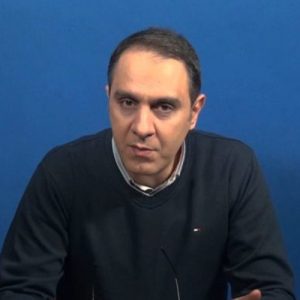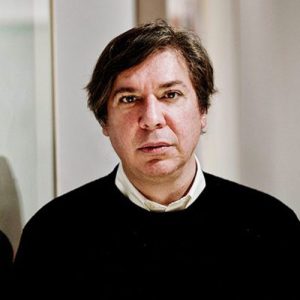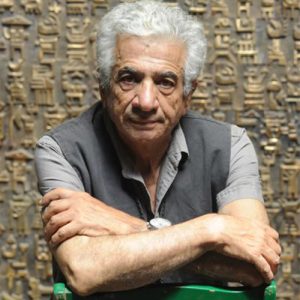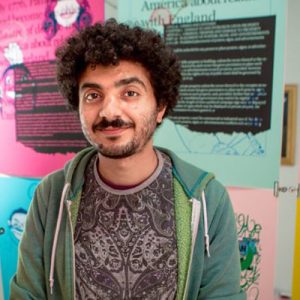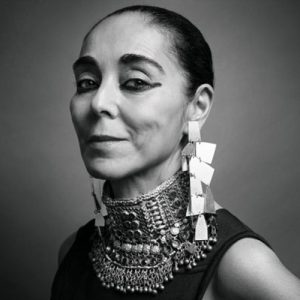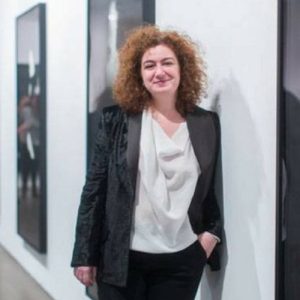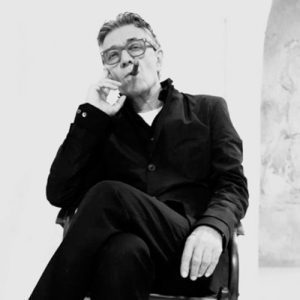
Born in Los Angeles in 1961, Mark Bradford earned a BFA in 1995 and an MFA in 1997 from the California Institute of the Arts, Valencia. From a young age, Bradford worked in his mother’s salon and referred to himself as a “beauty operator,” continuing to do so even as he earned recognition in the visual arts. Bradford’s early work often incorporated the tools of his trade, including singed permanent-wave endpapers, cellophane hair color, and human hair. In collage paintings like Daddy, Daddy, Daddy (2001), Bradford overlaid the translucent endpapers parallel to one another, their burned edges forming an imperfect, all-over grid. The corporeal mediums and delicate colors create a sense of intimacy and even nostalgia. However, this large-scale work’s burnt materials and compulsive, labor-intensive process could appear threatening, as reminders of a culturally mandated beauty regime. Though the composition is abstract, the materials evoke elements of Bradford’s personal narrative as well as the social and political significance of hair styling—especially hair straightening—in the black community.
In the mid-2000s, Bradford expanded his focus to examine the broader economic and racial geography of the communities in which he lived. In works like Black Venus (2005) and Scorched Earth (2006), he created imaginative maps of affluent black neighborhoods. The densely textured, vibrantly colored surfaces are built up from materials salvaged from the artist’s Los Angeles neighborhood and collaged into exploded grids that recall both the vernacular abstraction of mapmaking as well as the utopian abstractions of the modernists. From similar materials, Bradford has also made a series of “merchant posters” (2006–), inspired by the advertisements hung informally around inner-city areas. In these works, layers of billboard paper overlaid on texts outlined in string have been sanded down to reveal fragments of the original phrases, and they are displayed singly or in large accumulations that recall the sites where these ads typically hang. The texts, which offer services ranging from DNA testing to expedited immigration papers, target individuals in times of personal or economic crisis and provide a window into the challenges facing urban communities.
Alongside his work in painting and collage, Bradford has also explored issues of race, class, and gender in video, photography, sculpture, and installation. In the video Practice (2003) the artist struggles to play basketball while impeded by a modified Los Angeles Lakers uniform that includes an oversized antebellum-style hoop skirt. For Prospect.1 New Orleans (2008–09), the biennial organized in the aftermath of Hurricane Katrina, Bradford built and installed Mithra (2008), a massive ark built from shipping containers and recycled plywood fencing plastered with peeling ads, in the city’s stricken Ninth Ward. In Pinocchio Is On Fire (2010), a multimedia installation created for a retrospective at the Wexner Center for the Arts, Ohio State University, Columbus, Bradford appears in the guise of a fictional character based on R & B singer Teddy Pendergrass and is featured on album covers and in musical recordings and interviews.
Bradford’s work has earned many awards, including the Bucksbaum Award for Distinction at the 2006 Whitney Biennial and a MacArthur Fellowship (2009). His retrospective organized by the Wexner Center (2010) traveled to the Institute of Contemporary Art, Boston (2010–11); Museum of Contemporary Art, Chicago (2011); Dallas Museum of Art (2011–12); and San Francisco Museum of Modern Art (2012). Solo exhibitions of Bradford’s work have been held at the Whitney Museum of American Art, New York (2007), and Cincinnati Art Museum (2008), among other venues. His work has also appeared in group shows at such institutions as the Studio Museum in Harlem, New York (2001, 2005); Royal Academy of Arts, London (2006); Museum of Modern Art, New York (2008); and Aspen Art Museum (2010). In addition to Prospect and Whitney, Bradford’s work has been also presented in the São Paulo Biennial and Busan Biennial, South Korea (2006). Bradford lives and works in Los Angeles.


 Argoon Art | Sell online in the simplest way possible
Argoon Art | Sell online in the simplest way possible
